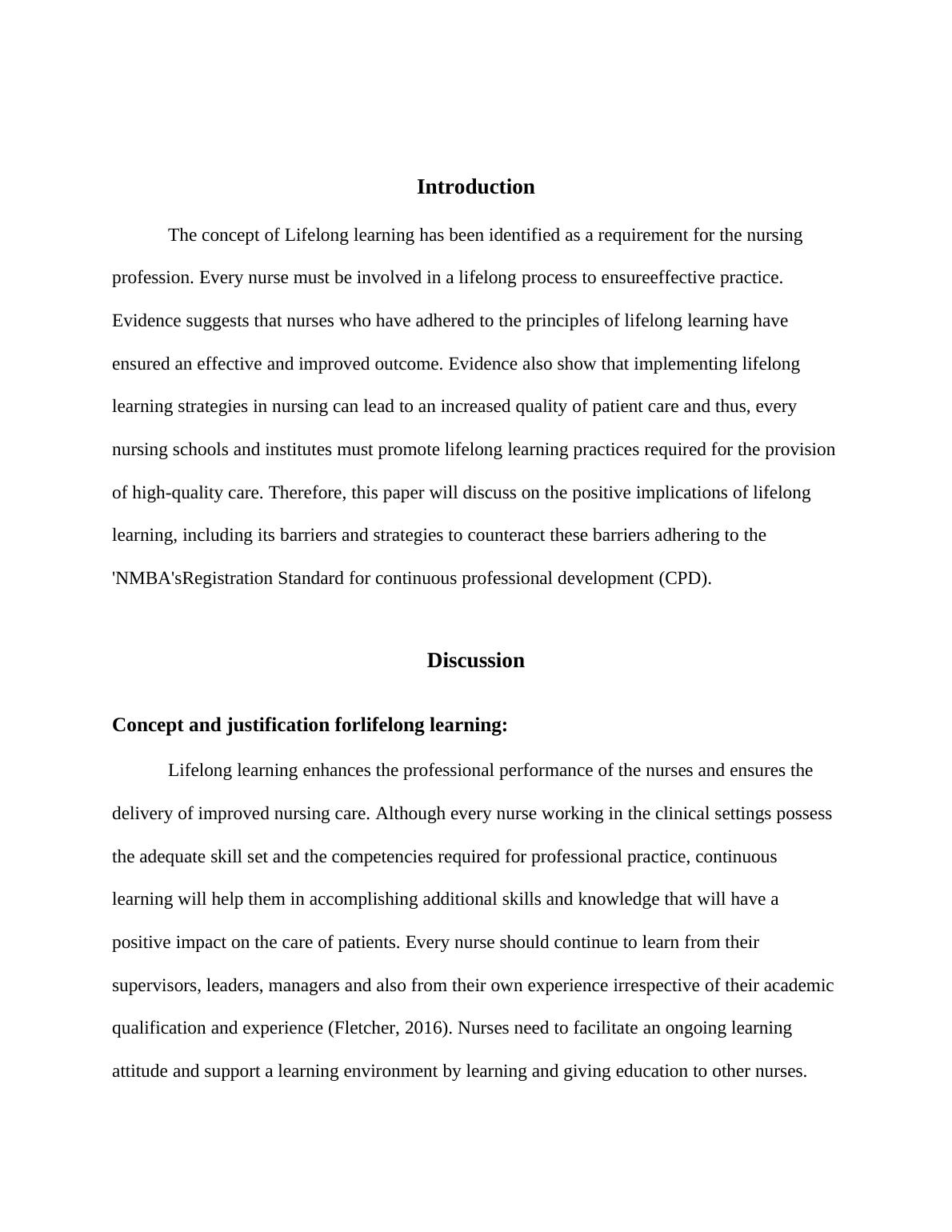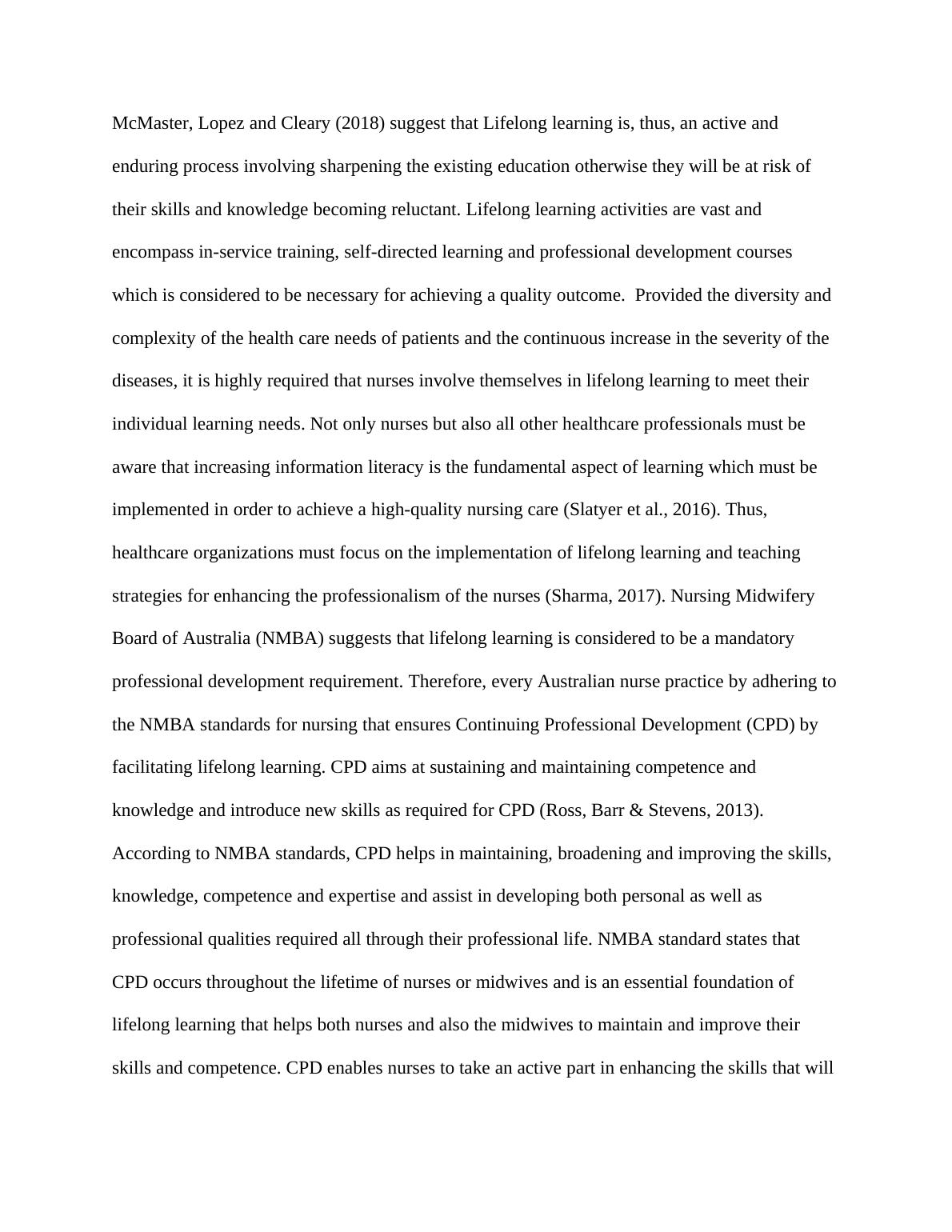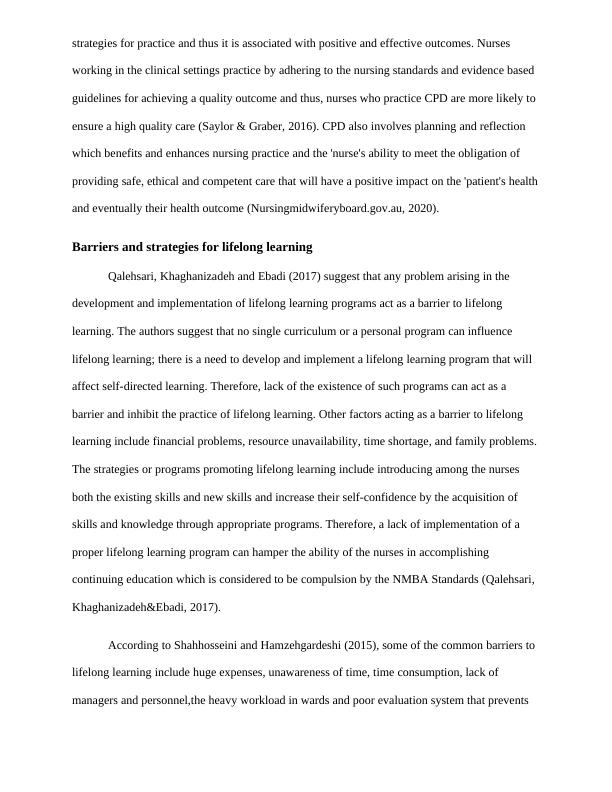The Concept of Nursing Profession
Added on 2022-08-08
10 Pages2747 Words24 Views
Introduction
The concept of Lifelong learning has been identified as a requirement for the nursing
profession. Every nurse must be involved in a lifelong process to ensureeffective practice.
Evidence suggests that nurses who have adhered to the principles of lifelong learning have
ensured an effective and improved outcome. Evidence also show that implementing lifelong
learning strategies in nursing can lead to an increased quality of patient care and thus, every
nursing schools and institutes must promote lifelong learning practices required for the provision
of high-quality care. Therefore, this paper will discuss on the positive implications of lifelong
learning, including its barriers and strategies to counteract these barriers adhering to the
'NMBA'sRegistration Standard for continuous professional development (CPD).
Discussion
Concept and justification forlifelong learning:
Lifelong learning enhances the professional performance of the nurses and ensures the
delivery of improved nursing care. Although every nurse working in the clinical settings possess
the adequate skill set and the competencies required for professional practice, continuous
learning will help them in accomplishing additional skills and knowledge that will have a
positive impact on the care of patients. Every nurse should continue to learn from their
supervisors, leaders, managers and also from their own experience irrespective of their academic
qualification and experience (Fletcher, 2016). Nurses need to facilitate an ongoing learning
attitude and support a learning environment by learning and giving education to other nurses.
The concept of Lifelong learning has been identified as a requirement for the nursing
profession. Every nurse must be involved in a lifelong process to ensureeffective practice.
Evidence suggests that nurses who have adhered to the principles of lifelong learning have
ensured an effective and improved outcome. Evidence also show that implementing lifelong
learning strategies in nursing can lead to an increased quality of patient care and thus, every
nursing schools and institutes must promote lifelong learning practices required for the provision
of high-quality care. Therefore, this paper will discuss on the positive implications of lifelong
learning, including its barriers and strategies to counteract these barriers adhering to the
'NMBA'sRegistration Standard for continuous professional development (CPD).
Discussion
Concept and justification forlifelong learning:
Lifelong learning enhances the professional performance of the nurses and ensures the
delivery of improved nursing care. Although every nurse working in the clinical settings possess
the adequate skill set and the competencies required for professional practice, continuous
learning will help them in accomplishing additional skills and knowledge that will have a
positive impact on the care of patients. Every nurse should continue to learn from their
supervisors, leaders, managers and also from their own experience irrespective of their academic
qualification and experience (Fletcher, 2016). Nurses need to facilitate an ongoing learning
attitude and support a learning environment by learning and giving education to other nurses.

McMaster, Lopez and Cleary (2018) suggest that Lifelong learning is, thus, an active and
enduring process involving sharpening the existing education otherwise they will be at risk of
their skills and knowledge becoming reluctant. Lifelong learning activities are vast and
encompass in-service training, self-directed learning and professional development courses
which is considered to be necessary for achieving a quality outcome. Provided the diversity and
complexity of the health care needs of patients and the continuous increase in the severity of the
diseases, it is highly required that nurses involve themselves in lifelong learning to meet their
individual learning needs. Not only nurses but also all other healthcare professionals must be
aware that increasing information literacy is the fundamental aspect of learning which must be
implemented in order to achieve a high-quality nursing care (Slatyer et al., 2016). Thus,
healthcare organizations must focus on the implementation of lifelong learning and teaching
strategies for enhancing the professionalism of the nurses (Sharma, 2017). Nursing Midwifery
Board of Australia (NMBA) suggests that lifelong learning is considered to be a mandatory
professional development requirement. Therefore, every Australian nurse practice by adhering to
the NMBA standards for nursing that ensures Continuing Professional Development (CPD) by
facilitating lifelong learning. CPD aims at sustaining and maintaining competence and
knowledge and introduce new skills as required for CPD (Ross, Barr & Stevens, 2013).
According to NMBA standards, CPD helps in maintaining, broadening and improving the skills,
knowledge, competence and expertise and assist in developing both personal as well as
professional qualities required all through their professional life. NMBA standard states that
CPD occurs throughout the lifetime of nurses or midwives and is an essential foundation of
lifelong learning that helps both nurses and also the midwives to maintain and improve their
skills and competence. CPD enables nurses to take an active part in enhancing the skills that will
help them in achieving an outstanding outcome, thus reducing errors and allowing the provision
of higher quality care (Kroning, 2016). NMBA suggest that CPD involves evidence based
enduring process involving sharpening the existing education otherwise they will be at risk of
their skills and knowledge becoming reluctant. Lifelong learning activities are vast and
encompass in-service training, self-directed learning and professional development courses
which is considered to be necessary for achieving a quality outcome. Provided the diversity and
complexity of the health care needs of patients and the continuous increase in the severity of the
diseases, it is highly required that nurses involve themselves in lifelong learning to meet their
individual learning needs. Not only nurses but also all other healthcare professionals must be
aware that increasing information literacy is the fundamental aspect of learning which must be
implemented in order to achieve a high-quality nursing care (Slatyer et al., 2016). Thus,
healthcare organizations must focus on the implementation of lifelong learning and teaching
strategies for enhancing the professionalism of the nurses (Sharma, 2017). Nursing Midwifery
Board of Australia (NMBA) suggests that lifelong learning is considered to be a mandatory
professional development requirement. Therefore, every Australian nurse practice by adhering to
the NMBA standards for nursing that ensures Continuing Professional Development (CPD) by
facilitating lifelong learning. CPD aims at sustaining and maintaining competence and
knowledge and introduce new skills as required for CPD (Ross, Barr & Stevens, 2013).
According to NMBA standards, CPD helps in maintaining, broadening and improving the skills,
knowledge, competence and expertise and assist in developing both personal as well as
professional qualities required all through their professional life. NMBA standard states that
CPD occurs throughout the lifetime of nurses or midwives and is an essential foundation of
lifelong learning that helps both nurses and also the midwives to maintain and improve their
skills and competence. CPD enables nurses to take an active part in enhancing the skills that will
help them in achieving an outstanding outcome, thus reducing errors and allowing the provision
of higher quality care (Kroning, 2016). NMBA suggest that CPD involves evidence based

strategies for practice and thus it is associated with positive and effective outcomes. Nurses
working in the clinical settings practice by adhering to the nursing standards and evidence based
guidelines for achieving a quality outcome and thus, nurses who practice CPD are more likely to
ensure a high quality care (Saylor & Graber, 2016). CPD also involves planning and reflection
which benefits and enhances nursing practice and the 'nurse's ability to meet the obligation of
providing safe, ethical and competent care that will have a positive impact on the 'patient's health
and eventually their health outcome (Nursingmidwiferyboard.gov.au, 2020).
Barriers and strategies for lifelong learning
Qalehsari, Khaghanizadeh and Ebadi (2017) suggest that any problem arising in the
development and implementation of lifelong learning programs act as a barrier to lifelong
learning. The authors suggest that no single curriculum or a personal program can influence
lifelong learning; there is a need to develop and implement a lifelong learning program that will
affect self-directed learning. Therefore, lack of the existence of such programs can act as a
barrier and inhibit the practice of lifelong learning. Other factors acting as a barrier to lifelong
learning include financial problems, resource unavailability, time shortage, and family problems.
The strategies or programs promoting lifelong learning include introducing among the nurses
both the existing skills and new skills and increase their self-confidence by the acquisition of
skills and knowledge through appropriate programs. Therefore, a lack of implementation of a
proper lifelong learning program can hamper the ability of the nurses in accomplishing
continuing education which is considered to be compulsion by the NMBA Standards (Qalehsari,
Khaghanizadeh&Ebadi, 2017).
According to Shahhosseini and Hamzehgardeshi (2015), some of the common barriers to
lifelong learning include huge expenses, unawareness of time, time consumption, lack of
managers and personnel,the heavy workload in wards and poor evaluation system that prevents
working in the clinical settings practice by adhering to the nursing standards and evidence based
guidelines for achieving a quality outcome and thus, nurses who practice CPD are more likely to
ensure a high quality care (Saylor & Graber, 2016). CPD also involves planning and reflection
which benefits and enhances nursing practice and the 'nurse's ability to meet the obligation of
providing safe, ethical and competent care that will have a positive impact on the 'patient's health
and eventually their health outcome (Nursingmidwiferyboard.gov.au, 2020).
Barriers and strategies for lifelong learning
Qalehsari, Khaghanizadeh and Ebadi (2017) suggest that any problem arising in the
development and implementation of lifelong learning programs act as a barrier to lifelong
learning. The authors suggest that no single curriculum or a personal program can influence
lifelong learning; there is a need to develop and implement a lifelong learning program that will
affect self-directed learning. Therefore, lack of the existence of such programs can act as a
barrier and inhibit the practice of lifelong learning. Other factors acting as a barrier to lifelong
learning include financial problems, resource unavailability, time shortage, and family problems.
The strategies or programs promoting lifelong learning include introducing among the nurses
both the existing skills and new skills and increase their self-confidence by the acquisition of
skills and knowledge through appropriate programs. Therefore, a lack of implementation of a
proper lifelong learning program can hamper the ability of the nurses in accomplishing
continuing education which is considered to be compulsion by the NMBA Standards (Qalehsari,
Khaghanizadeh&Ebadi, 2017).
According to Shahhosseini and Hamzehgardeshi (2015), some of the common barriers to
lifelong learning include huge expenses, unawareness of time, time consumption, lack of
managers and personnel,the heavy workload in wards and poor evaluation system that prevents

End of preview
Want to access all the pages? Upload your documents or become a member.
Related Documents
Developing a Plan for Nursing Practice: Learning Needs and Evaluation Processlg...
|25
|3811
|399
CPD and Professional Portfolio in Nursing Careerlg...
|9
|2545
|306
Continuing Professional Development (CPD) : Assignmentlg...
|5
|756
|66
Introduction to Nursing Praxislg...
|9
|2512
|26
Diploma of nursing in Australia: NMBA and ANMFlg...
|9
|2246
|461
Continuing Professional Development : Assignment - Deskliblg...
|4
|881
|212
